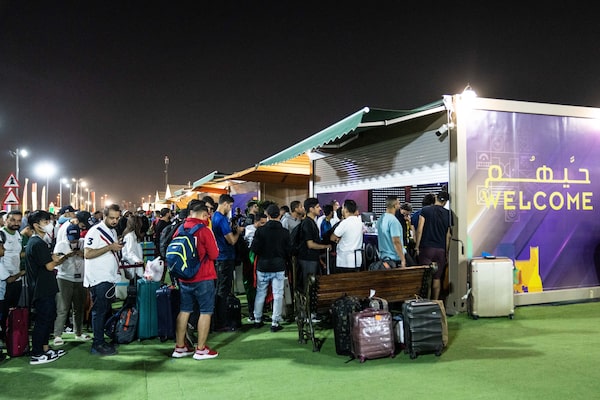
A deserted section of the Free Zone Fan Village, in Doha, Qatar, on Nov. 23.Jon Gambrell/The Associated Press
After Sheng Xie, a 33-year-old soccer fan from Vancouver, booked his flight to the World Cup, he went searching for accommodations.
Using the official tournament website, he quickly settled on a relatively affordable place called Fan Village. The room pictured looked functional and clean. There were two twin beds, Wi-Fi, air conditioning and a refrigerator, all for about $200 a night.
He did not realize it was, essentially, inside a shipping container.
“What did I book?” Xie asked himself in recent weeks as he began to see photos on social media of his accommodations under construction.
Thousands of cabins at a Fan Village in Qatar are an accommodation option for people visiting for the World Cup. The cabins in modified shipping containers have two beds and basic facilities for about U.S.$200 a night, and some fans are more impressed with the rooms than others.
The Globe and Mail
What he found when he arrived was a sea of colourful metal boxes, lined side by side in neat rows, lettered and numbered, stretching about as far as he could see. His container/trailer was one of thousands hastily set up in a dirt field near the airport. Workers said there were 4,000 of them. A map at the entrance showed plans for more than 7,500, plus a section set aside for employees. It was like a one-story Lego town.
And down the well-lit acres of artificial turf laid atop the pebbly soil; past the giant tent that serves as a dining hall, the big box that houses a grocery store, and all the little boxes that sell food or coffee or pharmaceuticals or fan gear; and not far from the outdoor gym and the soccer-field-size spaces where people can gather to watch soccer matches on a big screen, Xie found his room, in section E8, behind a metal door.

The check-in desk, where the wait can take hours, at Fan Village at the World Cup on Nov. 22.ERIN SCHAFF/The New York Times
Inside, it looked just like the picture. The air conditioning kept it cool enough, and the Wi-Fi worked. There were two small windows to let in a little light. He was relieved to know that the doors locked.
Tuesday night was his fifth night. Would he book it again?
Xie considered. He had just suggested that his chosen accommodations might provide a worthy template for housing the homeless in places like the United States and Canada, hardly a strong endorsement for a vacation setting.
“I’d probably say yes,” he said.

Workers at Fan Village at the World Cup on Nov. 22.ERIN SCHAFF/The New York Times
Qatar has a population of only about 3 million people, and fans from around the world jamming into Doha’s World Cup stadiums for four games a day have to stay somewhere. Most found hotels, and Doha offers a bevy of fancy brands. Others booked spots on one of a few docked cruise ships brought in for the occasion.
For many fans, though – particularly the more adventurous or frugal among them – the somewhere that they found is in a field that feels mostly like nowhere.
Qatar, after all, knows how to build massive swaths of utilitarian housing for temporary residents. The dusty outer reaches of Doha are filled with sprawling neighbourhoods not unlike this, with names like Asian Town and the Industrial Area, that are permanent encampments for the migrant workers who do most of the construction and service work in Qatar. World Cup organizers appear to have employed the concept as a solution for fans.
Not all options were as boxy as an adequately appointed shipping container. At a more upscale fan village called Al Khor, located a 40-minute drive north of central Doha near the beach, the concept is “Arabian camping.”

Gihana Fava and Renan Almeida, soccer fans from Brazil, in their rented room after checking in at Fan Village at the World Cup in Doha, Qatar, on Nov. 22.ERIN SCHAFF/The New York Times
Visitors stay in canvas tents adorned with furniture, plumbing, televisions and a refrigerator. There is a swimming pool, a restaurant, a collection of pop-up shops and a “fun zone” with a large fire pit and big-screen televisions. Advertised prices this week were more than $400 a night.
At the lower end of the spectrum is Caravan City, a collection of 1,000 boxy white trailers on wheels. Prices there began at about $115 per night.
But the far more common choice was containers, which organizers have deftly rebranded as “cabins.” They are, essentially, pop-up trailer parks, soccer-themed campgrounds, and there are three of them around Doha.
The one called Free Zone, where Xie stayed, has a hushed vibe, in between low-flying planes coming in and out of the nearby airport, due in no small part to the lack of alcohol on the premises. (Hotels are among the few places in Qatar where the sale of alcohol is permitted.) There is a sort of main street, a yellow-turf road that serves as a catwalk for a diverse mix of soccer fans.

Ms. Fava runs her finger through a layer of dust in her rented room.ERIN SCHAFF/The New York Times
Toward the horizon, the yellow turf dead-ends into a construction zone where, days into the tournament, heavy machinery was arranging still more containers. In the dark of Tuesday night, brigades of workers hooked up water and electricity, moved in furniture and cleaned the units for incoming guests.
When Xie arrived Friday, he was one of the first to check in. By Tuesday, the village was teeming and disorganized. The wait simply to check in took hours. Electric carts brought in to shuttle people to their far-flung rooms – Xie said he had tipped the man who delivered him to temporary home a few days ago – were parked with dead batteries.

Ms. Fava and Mr. Almeida react as they find the hot water working.ERIN SCHAFF/The New York Times
Gihana Fava and Renan Almeida, engaged to marry next year, arrived from Brazil. Like Xie, they booked the village without knowing quite what to expect, but the price was right. Hotels in the centre of the city were either booked or well above their budget, Almeida said.
After a long flight (and a missed flight), they spent nearly three hours Tuesday standing in a check-in line. Fava and Almeida finally got a key, got to a room and found that it was already occupied.
A new room – literally – was found. It was at the edge of the development, though, way out at S4, far from everything. There were twin beds, not the queen that they had booked. Everything was coated in a discernible layer of dust. The cleaners had not reached their unit yet.
Fava expressed worry that someone else might be handed a wrong key and come into their unit in the middle of the night. Could they leave their belongings safely here when they went to games?
Someone knocked on the door. Fava and Almeida were certain it was another guest, wrongly sent. But it was a worker, making sure the refrigerator worked. It appeared to be functioning.
The two tried the shower. It sprayed a strong stream of hot water. They smiled.
“I told Gihana that we should lower our expectations, expect the worst,” Almeida said. “Because it’s not a hotel.”